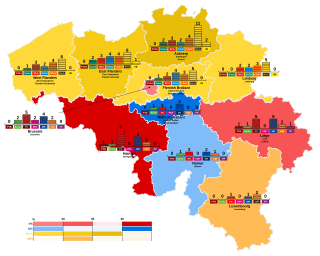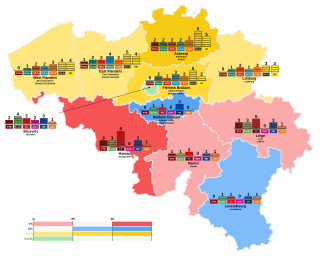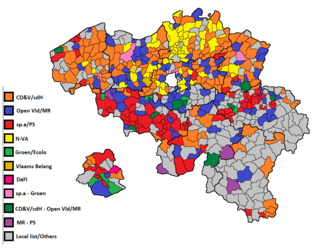Ecolo, officially Écologistes Confédérés pour l'organisation de luttes originales is a French-speaking political party in Belgium based on green politics. The party is active in Wallonia, the Brussels-Capital Region, and the German-speaking Community of Belgium.

DéFI is a social-liberal and regionalist political party in Belgium mainly known for defending French-speakers' interests in and near the Brussels region. Founded in 1964, the party is led by François De Smet, a member of the Chamber of Representatives. The party's current name, DéFI or Défi, was adopted in 2016 and is a backronym of Démocrate, Fédéraliste, Indépendant meaning "challenge" in French.

The Parliament of Wallonia is the legislative body of Wallonia, one of the three self-governing regions of Belgium. The parliament building, the former Hospice Saint-Gilles, is situated in Namur, the capital of Wallonia, at the symbolic confluence of the Meuse and the Sambre, the two main rivers of the most inhabited parts of Wallonia, the Sillon industriel. On the other side of the Meuse, facing the Parliament, is the Élysette, the seat of the Government of Wallonia.

Frédérique Ries is a Belgian politician and Member of the European Parliament for the French Community of Belgium with the MR/MCC/PRL, part of the Alliance of Liberals and Democrats for Europe.
The politics of Wallonia concern the government of Wallonia, that is the southern Region of Belgium.

The Dutch-speaking electoral college is one of three constituencies of the European Parliament in Belgium. It currently elects 12 MEPs using the D'Hondt method of party-list proportional representation. Previously it elected 13 MEPS, until the 2013 accession of Croatia. Before that, it elected 14 MEPs, until the 2007 accession of Bulgaria and Romania.
The 2007–2008 Belgian government formation followed the general election of 10 June 2007, and comprised a period of negotiation in which the Flemish parties Flemish Liberal Democratic, Christian Democratic and Flemish (CD&V) and New Flemish Alliance (N-VA), and the French-speaking parties Reformist Movement (MR), Democratic Front of Francophones (FDF) and Humanist Democratic Centre (CdH) negotiated to form a government coalition. The negotiations were characterized by the disagreement between the Dutch- and French-speaking parties about the need for and nature of a constitutional reform. According to some, this political conflict could have led to a partition of Belgium.

Philippe Lamberts is a Belgian politician serving as a Member of the European Parliament (MEP) since 2009. He is a member of Ecolo, within the Greens–European Free Alliance.

The Belgian provincial, municipal and district elections of 2012 took place on 14 October. As with the previous 2006 elections, these are no longer organised by the Belgian federal state but instead by the respective regions:

The Di Rupo Government was the federal cabinet of Belgium sworn in on 6 December 2011, after a record-breaking 541 days of negotiations following the June 2010 elections. The government included social democrats (sp.a/PS), Christian democrats (CD&V/cdH) and liberals, respectively of the Dutch and French language groups. The government notably excluded the New Flemish Alliance (N-VA), the Flemish nationalist party which achieved a plurality and became the largest party. Its absence, together with the unwillingness of Open Vld to enter into an eight-party coalition that included the green parties, caused the government coalition to lack a majority in the Dutch language group. It was the first time that the Belgian prime minister had been openly gay, as Di Rupo became the world's first male openly gay head of government. Elio Di Rupo also became the first native French-speaking prime minister since 1979 and the first prime minister from Wallonia since 1974 and first socialist prime minister since 1974.
The sixth state reform in the federal kingdom of Belgium is the result after the 2010–2011 Belgian government formation, with 541 days of negotiations, the longest ever in Belgium and possibly the world. The agreement was made among the Christian-democratic CD&V and cdH, social-democratic sp.a and PS, liberal Open Vld and MR and ecologist Groen! and Ecolo, each respectively a Flemish and French-speaking party. The first six parties, therefore not including the green parties, then formed the Di Rupo I Government. The Flemish nationalist party New Flemish Alliance, which became the largest after the 2010 elections, is notably not part of the agreement nor of the government coalition.

Federal elections were held in Belgium on 25 May 2014. All 150 members of the Chamber of Representatives were elected, whereas the Senate was no longer directly elected following the 2011–2012 state reform. These were the first elections held under King Philippe's reign.
Regional elections were held in Belgium on 25 May 2014 to choose representatives for the Flemish Parliament, Walloon Parliament, Brussels Parliament and the Parliament of the German-speaking Community. These elections were held on the same day as the 2014 European elections as well as the 2014 Belgian federal election.

An election was held on 25 May 2014 in the three Belgian constituencies to elect the Belgian delegation to the European Parliament. This election, part of the 2014 European Parliament election, was held on the same day alongside the Belgian federal election and the Belgian regional elections.

Federal elections were held in Belgium on 26 May 2019, alongside the country's European and regional elections. All 150 members of the Chamber of Representatives were elected from eleven multi-member constituencies.

The Belgian provincial, municipal and district elections of 2018 took place on Sunday 14 October 2018. They are organised by the respective regions:

Hainaut is one of the 11 multi-member constituencies of the Chamber of Representatives, the lower house of the Belgian Federal Parliament, the national legislature of Belgium. The constituency was established in 2003 following the re-organisation of constituencies across Belgium along provincial lines. It is conterminous with the province of Hainaut. The constituency currently elects 18 of the 150 members of the Chamber of Representatives using the open party-list proportional representation electoral system. At the 2019 federal election the constituency had 942,789 registered electors.

Brussels is one of the 11 multi-member constituencies of the Chamber of Representatives, the lower house of the Belgian Federal Parliament, the national legislature of Belgium. The constituency was established in 2014 following the Sixth Belgian state reform. It is conterminous with the region of Brussels. The constituency currently elects 15 of the 150 members of the Chamber of Representatives using the open party-list proportional representation electoral system. At the 2019 federal election the constituency had 623,162 registered electors.
Humanist Democratic Centre was a Christian democratic and centrist French-speaking political party in Belgium. The party originated in the split in 1972 of the unitary Christian Social Party (PSC-CVP) which had been the country's governing party for much of the post-war period. It continued to be called the Christian Social Party until 2002 when it was renamed the Humanist Democratic Centre. It was refounded as Les Engagés in 2022.














